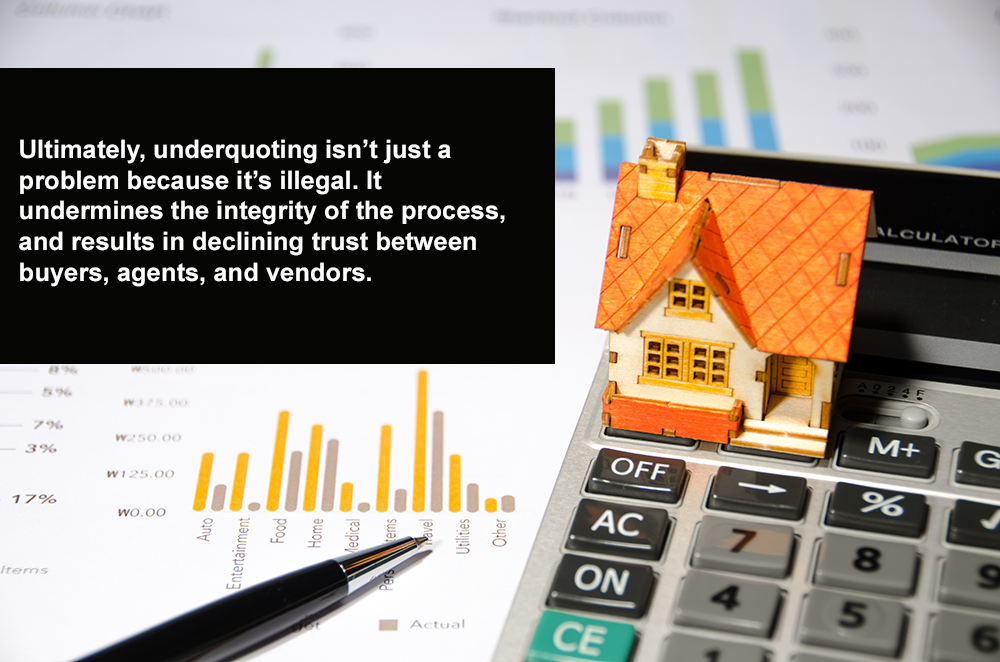Underquoting Is Becoming A Runaway Problem: Here’s What Should Happen
Originally published on Linkedin.
A recent report on Domain found that the number of complaints around underquoting, in NSW alone, more than tripled in 2021. NSW Fair Trading increased the number of fines issued by a multiple of five.
Underquoting is, of course, illegal, but with the market booming in the way that is has, it has become a tactic that the more underhanded agent has felt is worth the risk to boost the number of people that look at a property and participate in negotiations. When it’s successful, it can drive the price that the property ultimately sells much higher than it might have attracted otherwise. As the popular agent saying goes “quote it low, watch it go, quote it high, watch it die.”
It's a practice that needs to be stamped out, as it benefits neither buyer nor seller, nor the industry itself in the long term. With “serial underquoters” NSW Fair Trading has started taking additional actions beyond its ability to issue fines, such as requiring that repeat offenders have comparable pricing for every new listing signed off by at least two licensed agents. Social and regulatory pressure can also force agencies to clean house (i.e. remove repeat offenders from staff).
These are certainly good steps, but I would argue (and have done so in the media previously) that much more can be done.

- Make the fines count
Underquoting fines issued by NSW Fair Trading currently sit at $2,200. It should be higher to act as a real deterrent. A good number that is appropriate to the activity would be to set the fine at double the commission that the agent was due to earn, as well as the loss of the commission itself. So, for example, if the agent sold a $1 million property at a standard two per cent commission, they would be due $20,000. If they were found guilty of underquoting, an appropriate fine would be $40,000 and, if the vendor was not at fault, they should not pay the commission in the first place.
I would also recommend penalties for vendors that at found to be at fault, though. If the quote is below the agency agreement market estimate that the vendor was given & approved, then they should face the same fines, because, ultimately, the vendor’s responsibility is to know what the agent is doing, and sign off on any sales strategy. - Include a real threat to the agent’s career
Above and beyond the fines, there should be some teeth behind the sanctions. If the first instance of underquoting costs an agent the ability to sell for three months, the second instance result in a year’s ban, and the third instance becomes a lifetime ban, you’d find that agents think twice about underquoting very quickly.
Underquoting cannot be an innocent mistake, nor can it be possible to be mistakenly found guilty of it, so there is no risk that agents that are doing the right thing can be penalised this way, freeing the regulators to impose penalties that have teeth. - Increase the transparency up-front
So much of the risk of underquoting can be wiped away simply by making the process more transparent. If it was law for agents to openly display the “signed off” statement of facts they presented to the owner when signing the agency agreement at buyer inspections and online, the potential to underquote is immediately eliminated. This information should be presented in a simple and accessible manner, such as a one-pager that shows the three comparable sales that the agent used to arrive at their estimated selling range, and signed by the vendor to confirm its validity.
In addition, in the event that an unconditional offer is rejected, there should be a change in the price estimate to reflect the increased price expectations. This would ensure that future buyers will be protected from being misled at any point in the engagement.
There is no reason that this information should not be available to buyers, as it doesn’t compromise the ability of agents to represent vendors, nor does it impose limitations on the vendor’s ability to sell the property for a premium. It simply limits the ability to use underquoting as a tactic to artificially inflate demand.
Ultimately, underquoting isn’t just a problem because it’s illegal. It undermines the integrity of the process, and results in declining trust between buyers, agents, and vendors. It is a problem that affects the entire industry, and any steps that are taken to reduce the frequency that it occurs will be welcome across the entire industry.
For more information on how to identify and address underquoting, contact Hello Haus.
Back
